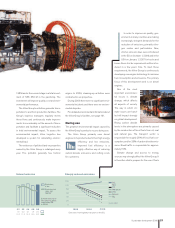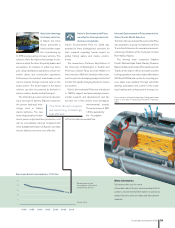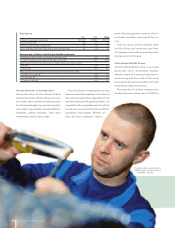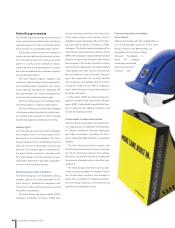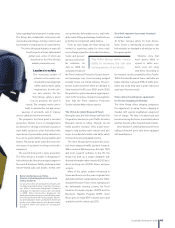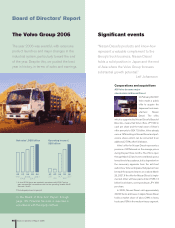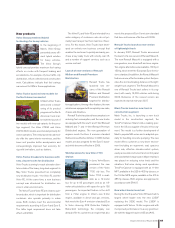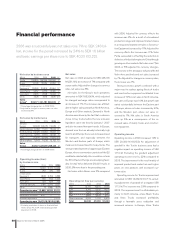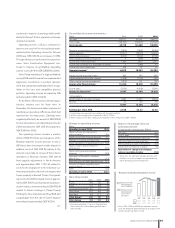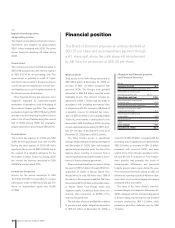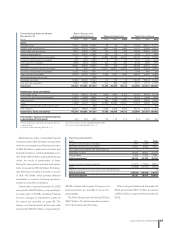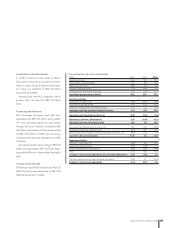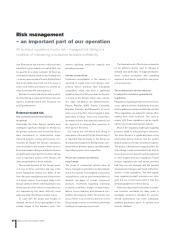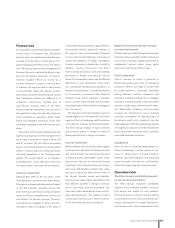Volvo 2006 Annual Report Download - page 51
Download and view the complete annual report
Please find page 51 of the 2006 Volvo annual report below. You can navigate through the pages in the report by either clicking on the pages listed below, or by using the keyword search tool below to find specific information within the annual report.
Sales in 2005 amounted to about SEK 32.5
billion. The company has 8,900 employees.
The study of coordination possibilities car-
ried out jointly by Volvo and Nissan Diesel iden-
tified synergies over five years of about EUR
200 M annually, slightly more than SEK 1.8 bil-
lion. The major portion of the integration gains
is as a result of increased purchasing volumes,
but positive effects also arise within product
development, engines and drivelines. Other
gains arise in that the companies have access
to each other’s dealer and service networks,
primarily in Asia but also in other parts of the
world.
Volvo assesses that the net interest-bearing
debt in Nissan Diesel in accordance with IFRS
amounts to about SEK 7.5 billion. Accordingly,
at full consolidation Volvo’s net financial pos-
ition, including the purchase consideration, will
decline by SEK 15 billion.
In March 2006, Volvo acquired 40 million
shares in Nissan Diesel, corresponding to 13%
of the votes and capital. In September of the
same year, Volvo increased its ownership to
58.2 million shares corresponding to 19% of
votes and capital. At the same time, Volvo pur-
chased all 57.5 million preference shares in the
company that through 2014 can be converted
in stages and which in 2014, after full conver-
sion, can provide Volvo with 46.5% of the votes
and capital in the company, after full dilution.
The acquisition strengthens the Volvo
Group’s Asian strategy and is intended to pro-
vide the Group with access to Nissan Diesel’s
dealer and service network in Japan and
Southeast Asia, and create a further industrial
cooperation with Nissan Diesel in such areas as
engines and transmissions.
AB Volvo, Nissan Motor and Dongfeng
Group, intend, together with Chinese authori-
ties, to evaluate how to best develop Dongfeng
Motor Co Ltd’s commercial vehicle business.
Dongfeng Motor Co. Ltd is jointly owned by
Nissan Motor and Dongfeng Group.
Agreement between Renault Trucks
and the GAZ Group
On June 19, Renault Trucks signed a frame-
work agreement granting the GAZ Group of
Russia to manufacture the Renault dCi 11
engine under license. The engines will be man-
ufactured for the Russian market and the CIS
states (Commonwealth of Independent States).
GAZ Group is a Russian automotive group with
operations that include the manufacturing of
trucks, buses, construction equipment and
cars, and the aim is to use Renault Trucks’
engines in the various vehicles. The agreement
includes the purchase of certain manufactur-
ing machinery and the possibility of using the
tooling as well as training.
Volvo plans bus body cooperation in India
Volvo Bus Corpora-
tion and the Indian
company Jaico Auto-
mobiles have reach-
ed an agreement to
start a joint company
in India for production of bus bodies based on
Volvo Buses’ body technology. Volvo Buses will
be the majority owner with a 70% stake in the
new company, which plans to build a new plant
with a capacity of 1,000 bus bodies per year.
The bus bodies will primarily be used for Volvo
buses and coaches in the Indian market, but
the new company will also investigate possibili-
ties to export buses to other Volvo markets.
Jaico Automobiles is a company in the Azad
Group, which carries out body building produc-
tion in Bangalore and Jaipur.
Volvo Construction Equipment
invests in China
In 2006, Volvo
Construction Equip-
ment (Volvo CE)
signed an agreement
covering an equity
investment of 70% in
Shandong Lingong Construction Machinery
Co. China is the world’s largest market for
wheel loaders. The total market in 2005 was
approximately 110,000 units. Lingong is the
fourth largest producer of wheel loaders in
China with a comprehensive dealer network
throughout the country. In addition to 16 differ-
ent models of wheel loaders, Lingong also has
a smaller range of backhoe loaders, road rollers
and excavators. Lingong has around 1,800
employees and in 2005 posted sales of SEK
2 billlion.
In January 2007, it was announced that all
necessary regulatory approvals for the equity
investment of 70% in Lingong were received
and the deal is now closed. Volvo CE has
invested RMB 328 M, corresponding to slightly
more than SEK 300 M, in exchange for 70% of
the equity in Lingong. In 2005 Lingong’s oper-
ating income was RMB 10 M on revenue of
RMB 2 billion. The deal has no material impact
on Volvo’s financial position.
Strategic decision on closure of Volvo
Aero’s operations in Bromma
In November, it was announced that Volvo Aero
had initiated codetermination negotiations with
the trade unions relating to the closure of Volvo
Aero Engine Services (VAES) in Bromma,
which conducts overhaul of large aircraft
engines. In recent years, the volumes of the
engines overhauled in Bromma, the JT8D and
JT9D, have declined sharply. Among other
actions, VAES has tried to offset the declining
volumes through complementing operations
with a third engine type, the PW4000, but vol-
umes have not reached the levels required. The
company has investigated other possibilities,
but all attempts have failed.
VAES in Bromma employs 456 persons, 145
salaried employees and 311 skilled workers. In
accordance with the strategic decision, the
operations will be gradually phased out during
2007. Costs for a closure are estimated to SEK
258 M.
Board of Directors’ Report 2006 47


